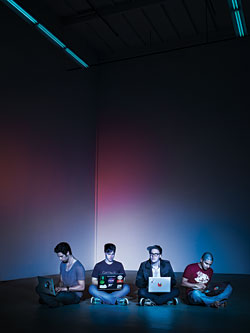 |
From left, Daniel Grippi, Ilya Zhitomirskiy, Maxwell Salzberg, and Raphael Sofaer.
(Photo: Jason Madara) |
In August, I sat down with the founders of the new social-networking system Diaspora*. Earlier that day, they’d given me a peek at the prototype for the service, which looked familiar: It had “status statements” and comments and photos, displayed on a clean, neutral interface.
But as the name suggests, their project was intended less as an imitation of Facebook than as an escape route from it—a path to freedom for those who had come to fear the dark side of the social network. In the years since Facebook launched (and long before Aaron Sorkin decided to take a whack at it), the service had begun to feel unsettling, sinister, less a benign link to friends and more a stealth database, open to all takers.
Diaspora*—if it worked—would do everything Facebook did. But users would own their data. If they wished, they could run their own servers. There would be no data-mining. No whiplash privacy protocols. And no Mark Zuckerberg.
Instead, users would be relying on Maxwell Salzberg, 23; Ilya Zhitomirskiy, 20; Daniel Grippi, 21; and Raphael Sofaer, 19. Four geeks who met at NYU’s Courant Institute of Mathematical Sciences, the friends have been in San Francisco all summer, coding in teams, often from 9 a.m. until 9 p.m., trying to ignore the skeptics who call Diaspora* “vaporware”: a dream of code that will never come true.
Their project began last February, inspired by a speech by free-software activist Eben Moglen. In late April, Salzberg uploaded a proposal on the fund-raising site Kickstarter, describing Diaspora* (the asterisk became a dandelion seed in the logo) as “the privacy-aware, personally controlled, do-it-all open-source social network.” Their goal was $10,000. Instead, they got coverage in the New York Times and $200,641 from 6,479 donors.
“The attention almost paralyzed us,” Salzberg tells me. Nonetheless, they flew west to begin “the ultimate summer project.”
Over Thai food, we chat about online intimacy, a phenomenon whose growth paralleled their own adolescence. “We’re doing this because we like social networking,” insists Salzberg, although they all admit to a native caution about their generation’s tendency toward the overshare. “We just don’t want it to come with all this other stuff. Crap you just don’t realize was there—that we didn’t always realize was there. The stuff that isn’t worth giving your whole life away for!”
Of course, like any creative collaboration, Diaspora* is itself a social network: four young men with slightly different visions of what they’re creating. Salzberg is the chatterbox and the promoter, worrying in circles, his cardigan sleeves tugged around his fists. Zhitomirskiy is “the most tinfoil hat about privacy,” an idealist fascinated by artificial intelligence and Warholian social experiments. Grippi, in skinny jeans and greaser hairdo, is a pragmatist who became fascinated with hands-on problem solving. And Sofaer, at 19, is the bratty younger brother, puncturing pretensions. (“I hate the asterisk,” he says. “You can quote me on that.”)
Yet the four share a set of values, one that reflects the thinking of a rising wave of young coders, a striking contrast with the jackpot-seeking entrepreneurs of the late nineties. They’re deeply concerned about privacy. They’re members of the “free culture” movement, dedicated to creative sharing online. They believe in “open source”: that computer code should be made public and shared, so it can be collaboratively improved. And they are very much about the power of doing it yourself, by hand—a hacker’s ideology of technological self-reliance, a philosophical stance they hope to spread to the “ordinary user.”
Loosely put, their influences include things like the hacker collectives Noisebridge (in San Francisco) and Resistor (in Brooklyn), cult magazines like Make (mission statement: “We celebrate your right to tweak, hack, and bend any technology to your own will”), and thinkers including Cory Doctorow and Clay Shirky. Like other young visionaries such as Moot (who created the chatboard 4Chan at 15), Andrey Ternovskiy (the Russian teenager who founded Chatroulette at 17), and Linus Torvalds (who created Linux, the open-source operating system now used in millions of computers, at 22), they see themselves as skilled laborers in a social emergency, nudging society in a better direction.
“‘Do it now or do it never’—that’s kind of how we operate,” says Salzberg.
Diaspora wasn’t the foursome’s first collaboration. That would be the Makerbot, a 3-D printer that builds objects by squirting thin layers of laminate, a kit they got from Make in its beta stages. Last fall, when Salzberg and Grippi became officers of a programming club at NYU, they began hosting antic weekly hacking sessions, hoping to stimulate membership. The friends bonded while baking circuit boards on a hot plate past 3 a.m. Then they printed out a shot glass and poured a celebratory shot—of Maker’s Mark.
The project inflamed their desire to create something more ambitious. But they didn’t know what that would be until the next February, when Eben Moglen gave a lecture titled “Freedom in the Cloud.” A professor of law and legal history at Columbia Law School and the founding director and chairman of the Software Freedom Law Center, Moglen is an intellectual celebrity to the hacker community. The room was packed and buzzing.

